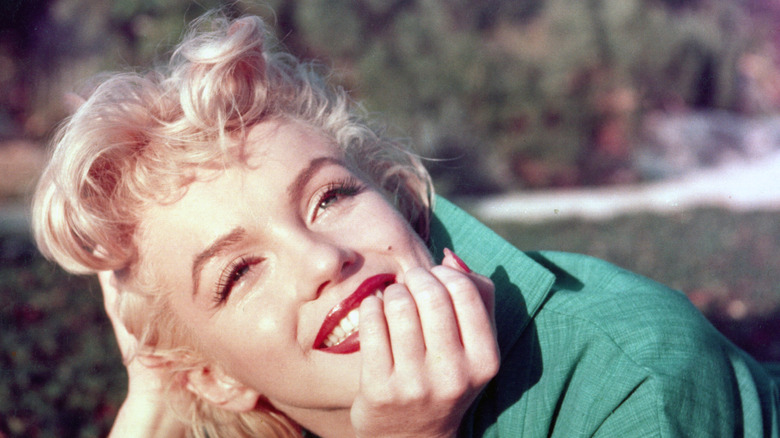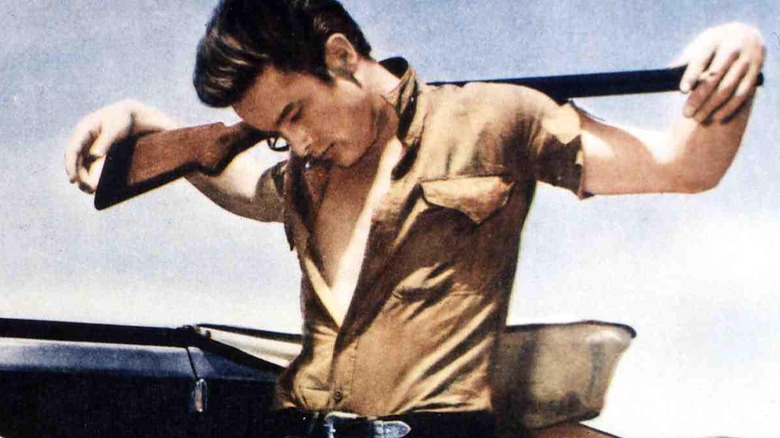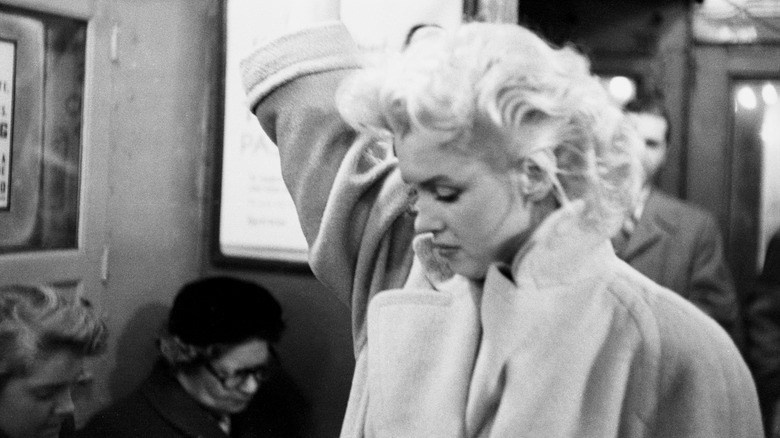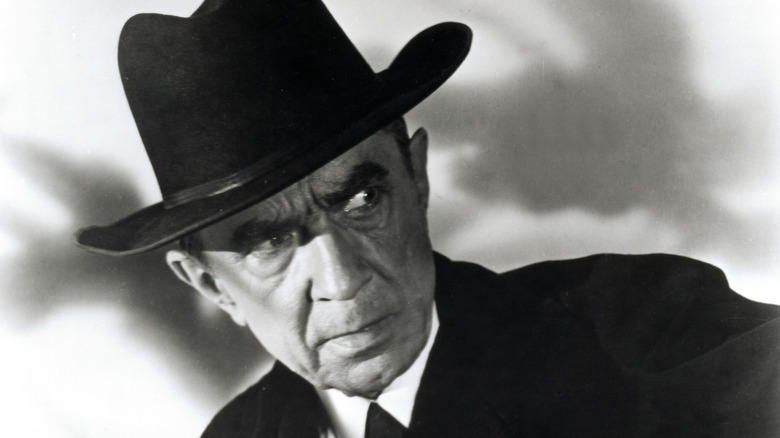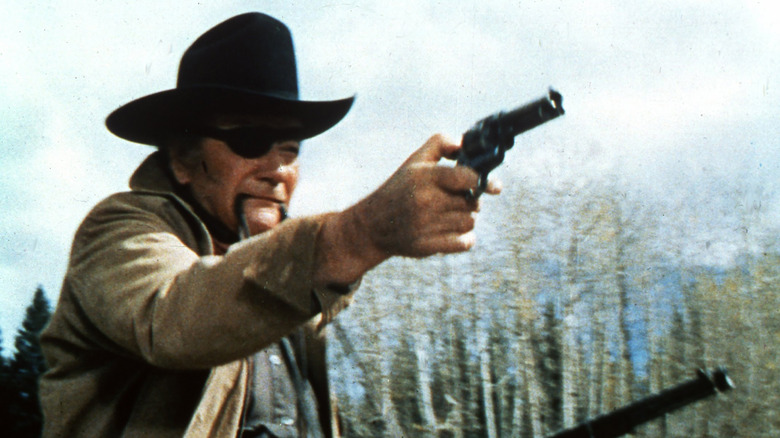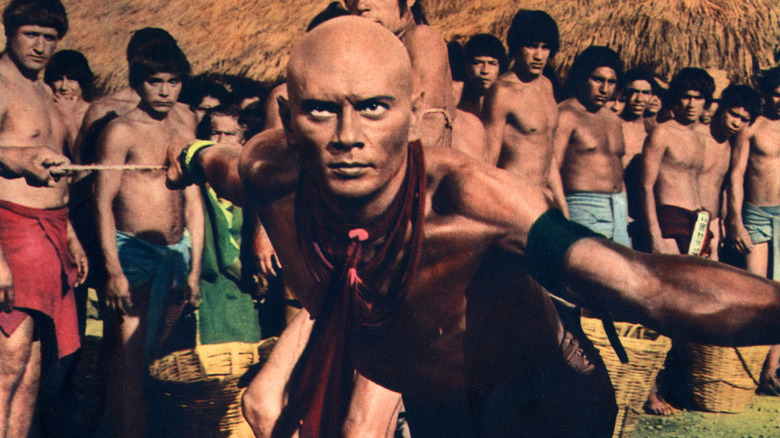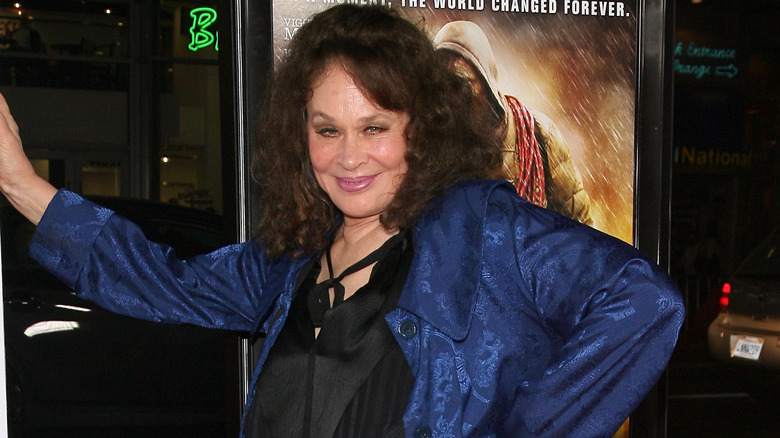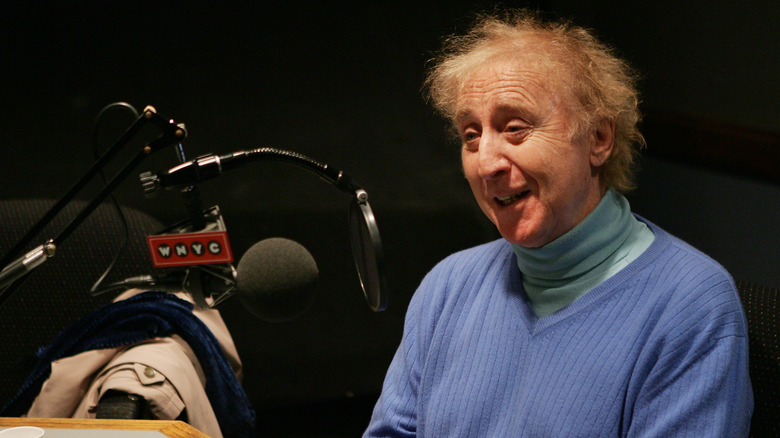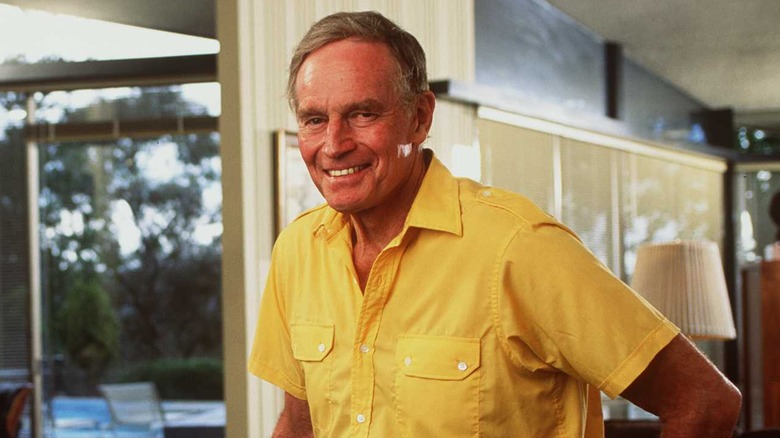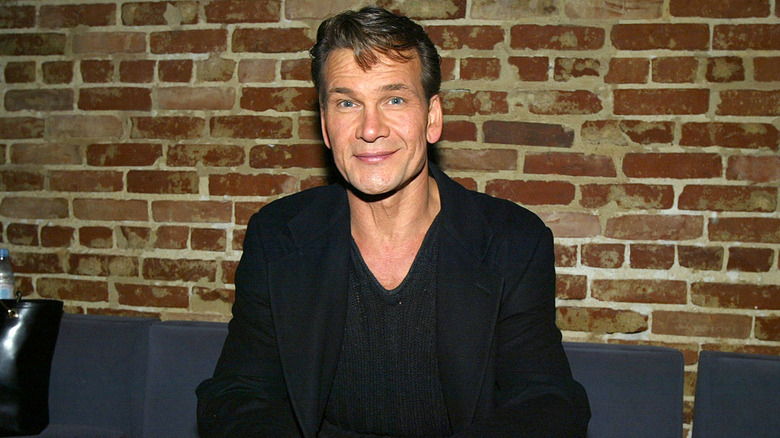Final Interviews Of Famous Actors
Correction 05/02/2022: A previous version of this article stated that Brittany Murphy's final interview was in 2003. Her final interview was in 2009, not 2003.
The idea of death as humanity's great equalizer has fascinated thinkers, poets, and common people for centuries. The Roman poet Horace wrote, "Pale death with impartial tread beats at the poor man's cottage and at the palaces of kings," and writers ranging from Shakespeare to Mitch Albom have echoed the truth of his sentiments. Nevertheless, there is often something both moving and fascinating in the deaths of the powerful, the wealthy, and the famous.
With the advent of motion pictures and their ensuing popularity, a new mythology was born. The movie star supplanted the gods and heroes of the past in a flashy and sometimes tawdry but always enticing pantheon called Hollywood. Dedicated fans devoured every scrap of information they could glean about their favorite actors, and the gossip press was only too happy to sate their endless appetites for scandal and drama. Ultimately, the only thing more exciting than a star's meteoric rise was, and is, a crushing fall, and no fall is more tragic or relatable than death.
Yet, a star's final public words can have a special power beyond the pull of mere morbid interest. When the death is unexpected, those words can take on a meaning far beyond the star's intent. On the other hand, the words of a star on the brink of death from illness or old age can serve a touching coda or a bitter epitaph to a life of fame. From the prophetic to the poignant, here's a look at the final interviews of some of Hollywood's most famous actors.
James Dean's final interview was eerily prophetic
As detailed in "James Dean: The Biography" by Val Holley, James Dean was born in Marion, Indiana on February 8, 1931. His parents, Winton Dean, a dental technician, and Mildred Dean, who worked as a drugstore clerk, moved to Fairmount, Indiana soon after the birth of their only son. In high school, Dean developed an interest in acting that would lead him to move to California, where he briefly studied theater at the University of California, Los Angeles, before dropping out to pursue acting. Bit parts and commercial work then led Dean to New York, where he studied under Lee Strasburg at the prestigious Actors Studio.
Dean's role in a Broadway play caught the eye of film director Elia Kazan, who cast him in 1955's "East of Eden," the only film he would live to see released. Starring roles in "Rebel Without a Cause" and "Giant" followed in quick succession.
Just 13 days before Dean's death, actor Gig Young interviewed the young star on the set of "Giant" for the TV show "Warner Brothers Presents." Dean, an avid racer, spoke with Young about safe driving and the importance of being "extra cautious" on the highway, ending the piece saying "Take it easy driving. The life you might save might be mine."
On September 30, 1955, Dean was killed instantly when a 1950 Ford Tudor driven by 23-year-old Donald Turnupseed turned left into the path of his Porsche Spyder on U.S. Route 466 near Cholame, California.
Life's last talk with a lonely Marilyn Monroe
No name is as synonymous with the words "movie star" as Marilyn Monroe. As the ultimate blonde bombshell, she set the standard for beauty for a generation and was a paradigm for the modern sex symbol. Beloved for her vivacious personality, breathy voice, and stunning physical attributes, she made her mark in such comedies as "Gentlemen Prefer Blondes," and "Some Like it Hot." Yet, her bubbly onscreen demeanor belied a life of loneliness and depression that would fuel her successful dramatic turns in films like "Bus Stop" and "The Misfits," her last completed film.
As documented by Biography, Marilyn Monroe was born Norma Jeane Mortenson on June 1, 1926. She spent much of her childhood in foster homes and an orphanage, where she was subjected to abuse and sexual assault.
While working in a munitions factory in Van Nuys, California, Norma Jean caught the eye of a professional photographer and launched a successful career in modeling. In 1946, she signed her first movie contract, dyed her red hair blonde, and rechristened herself Marilyn Monroe.
Monroe gave what would be her final interview to Life's Richard Merryman. In the article, Monroe spoke at length about the nature of fame, saying " ...everybody is always tugging at you. They'd all like sort of a chunk of you. They kind of like take pieces out of you." The interview appeared in the August 3, 1962, issue of Life, just two days before Monroe's dead body was discovered. Monroe died of an overdose of barbiturates in an apparent suicide.
If you or anyone you know is having suicidal thoughts, please call the National Suicide Prevention Lifeline at 1-800-273-TALK (8255).
Dracula star Bela Lugosi came clean with the press
As detailed in Gary Don Rhodes' 2006 book "Lugosi: His Life in Films, On Stage, and in the Hearts of Horror Lovers," Bela Lugosi was born Béla Ferenc Dezső Blaskó on October 20, 1882, in the town of Lugos in southern Hungary. Although his career on stage and in film spanned over 50 years, Lugosi will forever be known for his role as Dracula in Universal Studios' 1931 adaptation of Bram Stoker's classic novel.
Nearly destitute, Lugosi revealed in 1955 that he had become addicted to morphine first prescribed to him to alleviate severe leg pains and sciatica decades before. Knowing that he would die without help, he voluntarily entered a medical facility to receive treatment for his addiction. Upon his release, a fully rehabilitated Lugosi emerged from the hospital to speak to the press for what would be the last time. "It's a terrible ordeal to go through withdrawal," Lugosi told a reporter. "It's the greatest pain in the world. I became a new man. ... a new lease on life. I'm cured. I feel like a million dollars."
Optimistic about his future, Lugosi looked forward to getting to work on a new picture with his friend, notorious filmmaker Edward D. Wood Jr. Just a year later, Lugosi, 73, suffered a fatal heart attack while resting at his modest Hollywood apartment. Decked out in one of his Dracula capes, Lugosi was buried at Holy Cross Cemetery in Culver City, California.
Western star John Wayne's reflective last interview
Born Marion Robert Morrison in Winterset, Iowa, in 1907, John Wayne was a University of Southern California football star before a shoulder injury permanently sidelined him. As documented in "Shooting Star: A Biography of John Wayne," Wayne got his first taste of Hollywood moving props and furniture on the Fox backlot. Discovered by legendary director John Ford, Wayne would go on to epitomize Hollywood's image of the American cowboy in such films as "Stagecoach," "The Searchers," and "True Grit."
In 1964, Wayne was diagnosed with lung cancer. An operation to remove most of his left lung proved a stunning success. Wayne's openness about his condition endeared him even more to his loyal fans, and the medical community praised him for bringing attention to the disease.Yet, cancer was not through with John Wayne. Although Wayne had, in his own words, "licked the big C," in January 1979, doctors discovered a malignancy in the actor's stomach. Surgeons removed Wayne's complete stomach in a nine-hour emergency procedure.
Wayne gave his last interview to ABC's Barbara Walters just one day before the discovery of his stomach cancer. Looking back on his 50-year-career, Wayne commented on his mortality. "I want to hang around as long as I'm healthy and I'm not in anybody's way," Wayne told the veteran journalist. John Wayne made a final public appearance at the April 9, 1979 Academy Awards. He died on June 11, 1979, at UCLA Medical Center, aged 72.
Judy Garland: a last interview with a falling star
By the time Judy Garland was in her teens she had become one of Hollywood's biggest draws thanks to a series of popular musical comedies that paired her with teen star Mickey Rooney. In 1939, Garland starred as Dorothy in the universally beloved "The Wizard of Oz," which further increased her fame. Garland moved into more mature roles in the 1940s in films such as "Meet Me in St. Louis," but addiction and mental illness nearly ended her career. Later in life, she transitioned to recording and stage work with a series of successful concert tours followed by a triumphant return to film in 1954's "A Star is Born."
As documented in "Little Girl Lost" by Al DiOrio, by 1969, overwork, drug addiction, crash-dieting, and series of nervous breakdowns had taken a serious toll on Garland's health. In March of that year, she gave what would be her final interview to Radio Denmark. Sounding fatigued, Garland stated, "My life and my career have been like a roller coaster. I'm either an enormous success or just a down and out failure." When asked if she felt that she had led a rich life, Garland, recently married to fifth husband Mickey Deans, replied, "No, not until now. I think it's been an interesting life. I loved always giving performances to audiences... But I can't take the audience home with me." Three months after this interview, Judy Garland was found dead of an accidental drug overdose in her London home.
Yul Brynner's last interview came with a warning
Immortalized in his signature role as King Mongkut of Siam in the musical "The King and I," a part he would play on Broadway over 4,000 times, Yul Brynner was an enigmatic figure. With his shaved head and stentorian voice, he was an imposing presence in roles ranging from the Pharaoh Ramses in "The Ten Commandments" to the android gunslinger in "Westworld." Yet, according to his son, Rock Brynner, author of "Yul: The Man Who Would be King," the actor's greatest creation was his own persona. When Rock Brynner challenged his father about the inconsistencies he found while researching his past, the actor replied, "The facts of my life have nothing to do with the realities of my existence."
Although the details of Yul Brynner's beginnings are murky, the facts of his sad last days are irrefutable. Aware that his death from lung cancer was imminent, Brynner appeared on ABC's "Good Morning America" on January 7, 1985. When asked by host David Hartman if there was anything he could change about his life, Brynner answered "If I could take back that smoking, we wouldn't be talking about any cancer. I'm convinced of that." After Brynner's death the following October, his widow, Kathy, gave the American Cancer Society permission to use footage from the interview in a powerful anti-smoking campaign, fulfilling one of her husband's final wishes. In the PSA, Brynner looks directly into the camera and says, "Now that I am gone, I tell you, don't smoke."
Cult movie queen Karen Black's heart-wrenching final interview
Karen Black rose to fame in the late 1960s and early '70s in such films as "Easy Rider," "Five Easy Pieces," and "Nashville." Although Black's dramatic roles garnered her three Golden Globe Awards and an Academy Award nomination, her work in horror films endeared her to generations of cult movie fans. Among her most memorable genre roles was that of a woman who does battle with an evil, animated Zuni fetish doll in Dan Curtis' "Trilogy of Terror" and Mother Firefly, the matriarch of a family of killers, in Rob Zombie's "House of 1,000 Corpses."
As documented by The Hollywood Reporter, Black was diagnosed with ampullary cancer in 2010. After having part of her pancreas removed, Black's health rapidly declined. Her weight dropped from 156 to 96 pounds and she was bedridden for her final months. Three weeks before her death on August 8, 2013, Black gave a final interview to publicist and entertainment personality Elliott Mintz from her hospital bed. In the interview, a frail Black looked back at her career with both gratitude and regret, citing her 1975 role in John Schlesinger's "The Day of the Locust," a film highly critical of Hollywood and the film industry, as marking a downturn in her career as a mainstream actress. "There were many things that would have happened had I still been loved and accepted as I was previous to 'Day of the Locust,' Black told Mintz. "... I was taken off the 'A' list."
Gene Wilder was disappointed in modern movies
The late Gene Wilder made a career of playing off-kilter characters. From Roald Dahl's famous chocolatier Willy Wonka to Frederick Frankenstein (that's pronounced "Fronkensteen") in Mel Brooks' comedy classic "Young Frankenstein," Wilder brought eccentric characters to life with a sensitivity rare among comic actors.
Despite his fame, Wilder was a private man who rarely gave interviews. In one of his last before his death at age 83 from complications of Alzheimer's disease, he spoke with Robert Osoborne of Turner Classic Movies about why he retired from acting. "Once in a while, there was a nice, good film, but not very many," Wilder said. "...but then I didn't want to do the kind of junk I was seeing. I didn't want to do 3D, for instance. I didn't want to do ones where it's just bombing and loud and swearing." Wilder also took aim at Tim Burton's take on Willy Wonka, a role Wilder made famous. "I think it's an insult," Wilder told Osborne. "...I don't care for that director. He's a talented man, but I don't care for him doing stuff like he did."
Brittany Murphy: a blessed life and a controversial death
Born November 10, 1977, in Atlanta, Georgia, Brittany Murphy got her first big break in acting at age 14, playing Dabney Coleman's character's daughter on the sitcom "Drexell's Class." Her supporting role as the uncool Tai Frasier in the 1995 coming-of-age comedy "Clueless," however, catapulted her to international fame. Critically acclaimed roles in such films as "Girl Interrupted," "8 Mile," and "Sin City," and a long-running voice role on the animated comedy "King of the Hill" followed.
According to Biography, Murphy's life took a tragic downturn at the end of 2009. Unexpectedly dropped from a film she had been shooting in Puerto Rico, the actress denied rumors that she had been fired from the project. However, news later broke that her "bizarre" behavior on set had led to her dismissal.
On December 20, 2009, Murphy, 32, collapsed at her home and died from a combination of pneumonia, anemia, and intoxication of multiple over-the-counter and prescription drugs. Despite the coroner's report, her family and others would offer a number of alternate theories for her cause of death, including intentional poisoning.
Appearing distracted and dazed, Brittany Murphy gave her final interview to Fox News' Pop Tarts on December 3, 2009, just over two weeks before her death. In the interview, she addressed her dramatic weight loss and promoted the charity Looking Beyond, which aids underprivileged children in need of medical prosthetics. "I feel very blessed for everything I have in my life and my family," Murphy said.
Charlton Heston was stoic in the face of Alzheimer's disease
From biblical epics to dystopian sci-fi thrillers, Charlton Heston brought gravitas to every film he starred in. Heston's role as Moses in "The Ten Commandments" made him a superstar, and roles in several historical dramas, including "Ben Hur" for which he earned an Academy Award, followed. By the late 1960s and early '70s, Heston remolded himself as an action star thanks to such films as "Planet of the Apes" and "Earthquake."
In his later years, Heston was an outspoken advocate of conservative causes, and in 1998, he was elected president of the National Rifle Association.
As reported by CNN, Heston announced that he had Alzheimer's disease in 2002. Heston spoke to ABC's Peter Jennings about his diagnosis in his last public interview, in . "You have to take it as it comes," Heston told Jennings. "You do the best with your life that you can, and what can't be cured must be endured." Heston died on April 5, 2008, aged 84.
Patrick Swayze's inspirational final interview
Texas-born '80s heartthrob Patrick Swayze began his career as a professional dancer before finding success on Broadway in "West Side Story" and "Grease." As detailed by Biography, Swayze's stage work eventually led him to Hollywood, where he scored his breakout role as Daryl "Darry" Curtis in Francis Ford Coppola's 1983 film adaptation of S.E. Hinton's teen novel "The Outsiders."
Swayze's skills as a dancer came to the forefront in the 1987 hit "Dirty Dancing," which established him a Hollywood sex symbol. The hits "Roadhouse," and "Point Break," also scored Swayze points with action fans.
Diagnosed with stage-four pancreatic cancer in 2008, Patrick Swayze spoke to Barbara Walters eight months before his death in September 2009. Despite his declining health, Swayze was determined to beat the odds. "I want to last until they find a cure which means I better get a fire under it," he told Walters.
Carrie Fisher's last talk show appearance
Carrie Fisher enchanted millions as Princess Leia in the "Star Wars" saga, and gained respect behind the scenes as a fiercely talented novelist and screenwriter with an acerbic wit. Yet, for much of her life, Fisher faced mental health issues and drug addiction — subjects she spoke about with frankness and humor.
As reported by Bustle, Fisher had been in England promoting her book "The Princess Diarist" when she appeared on "The Graham Norton Show." Taped just weeks before she suffered a heart attack while on a flight from London to Los Angeles, Fisher spoke with humor and pathos about finding her "Star Wars"-era diaries. "I'd forgotten I wrote them. They were in a storage room under my bedroom and so we brought all these things up thinking I'd put them in a book," Fisher said. "I found these three diaries and I was a little saddened by them. I'm very insecure in the books, and I didn't recall that I was that insecure."
